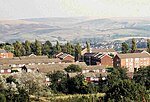Roch Valley Viaduct
Buildings and structures demolished in 1972Buildings and structures in RochdaleDemolished bridges in EnglandGreater Manchester building and structure stubsRailway viaducts in Greater Manchester ... and 2 more
United Kingdom bridge (structure) stubsUse British English from August 2017
Roch Valley Viaduct was a viaduct built in the 1860s in Rochdale, historically in Lancashire, now within Greater Manchester, that carried the Rochdale to Bacup railway line between Rochdale and Wardleworth stations. It was demolished in 1972. A trial explosion was carried out at one arch at the section over the River Roch, and inadvertently, the rest of the viaduct came down as well. Nobody was hurt, but gas and water mains were disrupted and a road was blocked.
Excerpt from the Wikipedia article Roch Valley Viaduct (License: CC BY-SA 3.0, Authors).Roch Valley Viaduct
Gowers Street,
Geographical coordinates (GPS) Address Nearby Places Show on map
Geographical coordinates (GPS)
| Latitude | Longitude |
|---|---|
| N 53.619606 ° | E -2.140753 ° |
Address
Gowers Street
Gowers Street
OL16 2LN , Wardleworth
England, United Kingdom
Open on Google Maps






